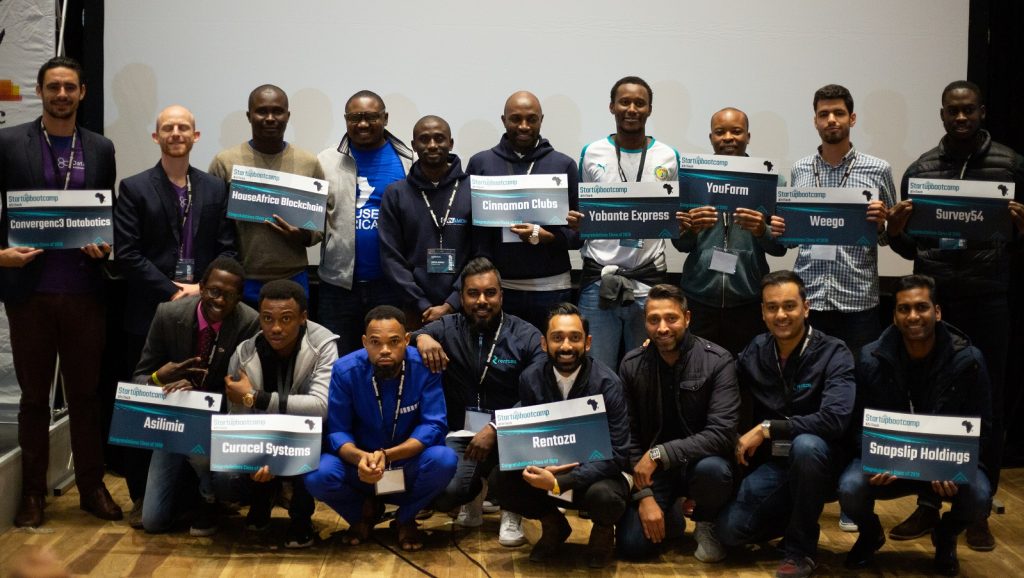Have you ever wondered how much easier travel has become, thanks to the digital innovations shaping our world? Exploring new destinations used to mean…
Here’s what startups had to say about SBC AfriTech’s 2019 programme

Ten African startups are ready to grow their business offerings, after graduating from Startupbootcamp Afritech’s (SBC Afritech) latest cohort. This year’s programme concluded with a demo day held in Cape Town on 7 November.
In an earlier statement following the conclusion of the 2019 cohort’s demo day, SBC AfriTech CEO and co-founder Philip Kiracofe commented that the graduation of the 10 startups from the programme is “just the beginning” for these firms.
“It is the latest validation that corporate-startup collaboration can produce extraordinary solutions for Africans, by Africans,” he added.
While 11 startups were initially selected by SBC Afritech to take part in the cohort, only 10 participated in the cohort.
Kiracofe told Ventureburn that Moroccan startup Weego had dropped out before the beginning of the programme.
“They had resource scheduling challenges that arose and they withdrew immediately following the Final Selection Days, so they never started the programme,” he said.
SBC AfriTech’s 2019 cohort came to an end on 7 November
He added that SBC Africatech remains committed to supporting Weego and the other startups that attended the organisation’s final selection days, as these firms represent the top one percent of all its applicants.
But just how has the 13-week programme benefited its third cohort?
Asilimia co-founder and CEO Tekwane Mwendwa, whose Kenyan fintech startup won the Africa Cup and a R5-million investment offer from pan-African investment firm the Unicorn Group, credited the accelerator for the company’s participation in the pitching competition (see this story).
He pointed out that if he hadn’t travelled to Cape Town for the programme, then he would not have participated in the pitching competition.
He said the startup has had a better response rate from investors after being accepted into SBC AfriTech’s programme.
The accelerator, he added, also helped the startup get “fully prepared” for its $350 000 deal with Unicorn Group.
Cinnamon Clubs founder and CEO Dickson Mushabe, said in the same statement that during the course of the programme, he acquired many skills that have benefited his company.
The startup’s management portal helps investment clubs to manage their records and improve their efficiency in collections, activity monitoring, financial analysis and reconciliation.
Mushabe said the skills will in turn help the treasurers of savings and investment clubs to automate the club’s bookkeeping.
As a result of its learnings, Cinnamon Clubs claims to have now made history by becoming the first company to offer insurance on loans to informal savings and investment clubs in Uganda.
Databotics director Paulo Scholle said the accelerator programme has enabled him and his team to build a scalable, repetitive business model as opposed to the consulting model they were using initially.
By offering their robotic process automation solution to small businesses, the startup can now generate annuity income and scale effectively.
The SA startup enables companies to liberate employees from routine, repetitive tasks so they can focus on more strategic, value-adding roles.
For Nigerian startup HouseAfrica, its biggest achievement was powering the country’s first blockchain-based real estate transactions.
COO Ndifreke Udo and CEO Uba Nnamdi Chukwuebuka said that this was an offshoot of their collaboration with the Nigerian Mortgage Refinancing Company which will give the blockchain-based land registry the opportunity to exclusively service 100 000 land titles across six states.
The startup will soon it will be expanding across the whole of Nigeria.
Over the past three months, SA startup Rentoza — which claims to be Africa’s first on-demand rental platform — says it has grown substantially.
Rentoza CEO Chris Govender said that to date over 2000 users have visited the platform, with 167 transactions having been concluded.
Lynton Naicker, the founder of SA startup Snapslip Holdings, said the accelerator has taught him not to fall in love with the solution, but to rather fall in love with the problem.
“This has revolutionised the way we’ve provided what customers need and want through our offering,” said Naicker.
After taking a top spot at the inaugural Prosperity Games hosted by the UK SA Tech Hub, the digital receipting solution has been awarded an opportunity by the UK government to scale within the country and participate in the first ever UK Africa Investment Week.
The startup is currently running a pilot project, servicing 350 stores in the RCS retail network.
Survey54 CEO and co-founder Stephan Eyeson said the programme has encouraged the British survey intelligence platform to put more machine learning into their product in order to deliver smart insights.
In addition, the company said it has benefitted from introductions to corporates like MTN and Distell, particularly in terms of getting commitments for its fundraising rounds and completing pilots.
Oumar Basse the CEO and co-founder of Senegalese startup Yobante Express said before the end of the year the company — which connects e-commerce retailers, businesses and individuals with independent and casual couriers — expects to begin operating in Senegal, South Africa, Zimbabwe, Botswana, Nigeria and Ghana.
The startup’s clients currently include Jumia, Delta, Chiwa and OuiCarry.
Zimbabwan startup YouFarm provides farmers with access to collateral-free finance by getting people to invest in crops and livestock and then share the profits when the produce goes to market.
The startup said it has successfully launched in South Africa and has plans to enter Mozambique, Tanzania and Namibia in the near future.
YouFarm CEO John-Paul Matenga said the startup is hoping to fund as many farmers as it can in Southern Africa.
One of the first projects available for investors is a new vineyard project in Khayelitsha, which will be the first crowd funded wine farm in South Africa.
Startupbootcamp will be launching new programmes next year which will include SBC Insurtech and SBC Smart Cities, along with an accelerator to address the UN’s Sustainable Development Goals.
Read more: Here are the 11 startups selected for the third cohort of SBC AfriTech
Featured image: The 11 startups selected for the third cohort of SBC Afritech (Supplied)

